Caraway Sauté Pan vs. Our Place Always Pan: Which Popular Skillet Is Right for You?
PureWow Editors select every item that appears on this page,, and the company may earn compensation through affiliate links within the story You can learn more about that process here. Yahoo Inc. may earn commission or revenue on some items through the links below.
Read the original article on Purewow.
If you’re a foodie with an Instagram account, you’re all too familiar with the cult-favorite cookware from both Caraway and Our Place. The brands sell everything from food storage containers to pressure cookers, but their most essential skillets—the Sauté Pan ($145) and the Always Pan 2.0 ($150), respectively—are incredibly popular with newbies and veteran cooks alike. Both are beloved for their nonstick powers, nontoxic materials and easy-on-the-eyes designs—so how can you decide which is best for you? We tested both pans to bring you our honest reviews, so you can uncover your fave (without having to shell out the cash for both). Read on for photos and breakdowns of the skillets.
Want to know which buzzy products are *really* worth buying? Sign up for our shopping newsletter to uncover our favorite finds.
The 12 Best Nontoxic Cookware Options You Can Buy, According to a Food Editor
Meet the Experts
How I Tested the Our Place Always Pan and Caraway Sauté Pan
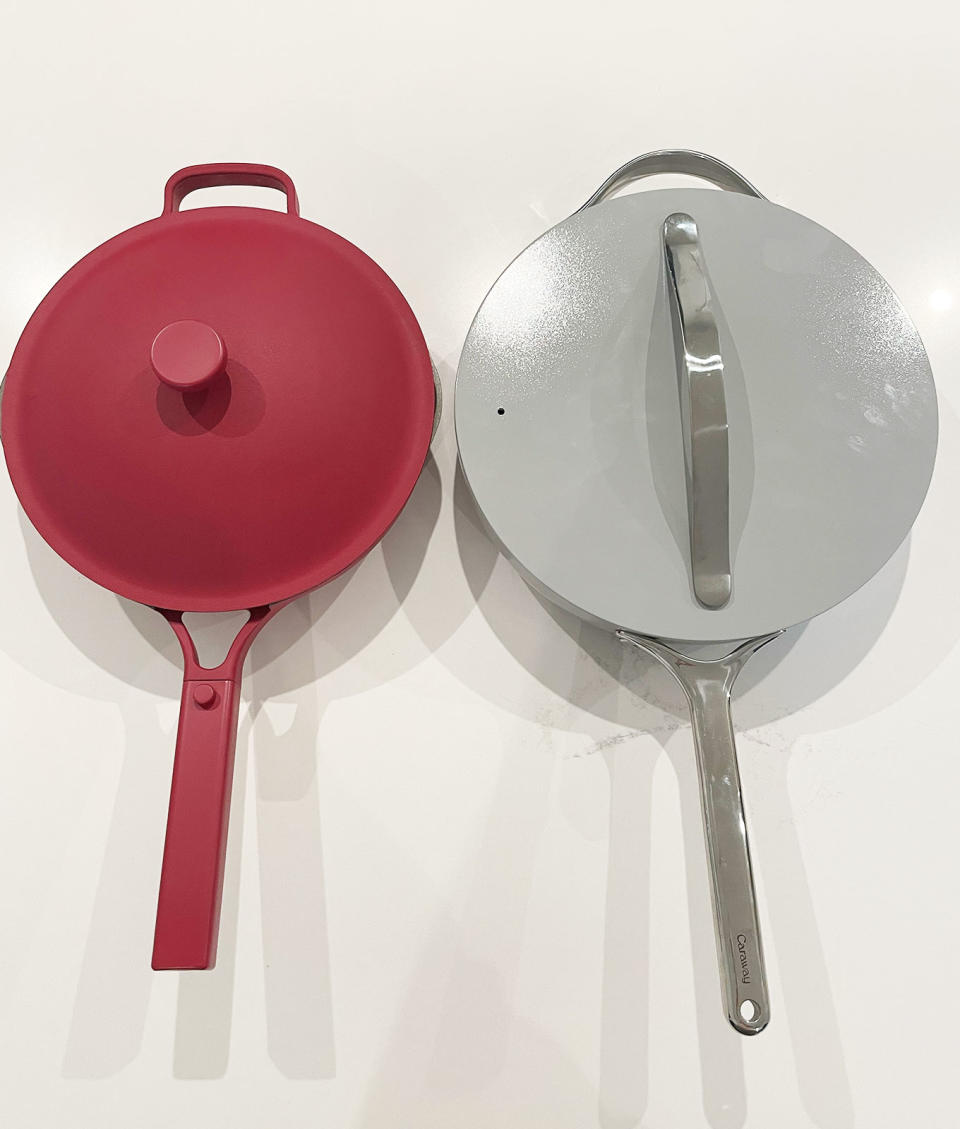
Taryn Pire
I cooked with and cleaned the skillets over the course of a month to see how well they held up to regular use and to find out if the brands’ claims (like the pans’ versatility and nonstick capabilities) were true. After cooking with them many times, I rated the pans based on the following five factors:
Value: Is the skillet worth the cost considering its quality and capabilities?
Functionality: Does the skillet do what it’s supposed to do? Is it easy to use?
Quality: Is the skillet made with high-quality materials? Is it durable?
Aesthetics: Does the skillet have an attractive appearance?
Versatility: How much can the skillet do? Can you tackle many different cooking techniques and recipes with it or is it a one-trick pony?
What Sets Our Place and Caraway Apart?
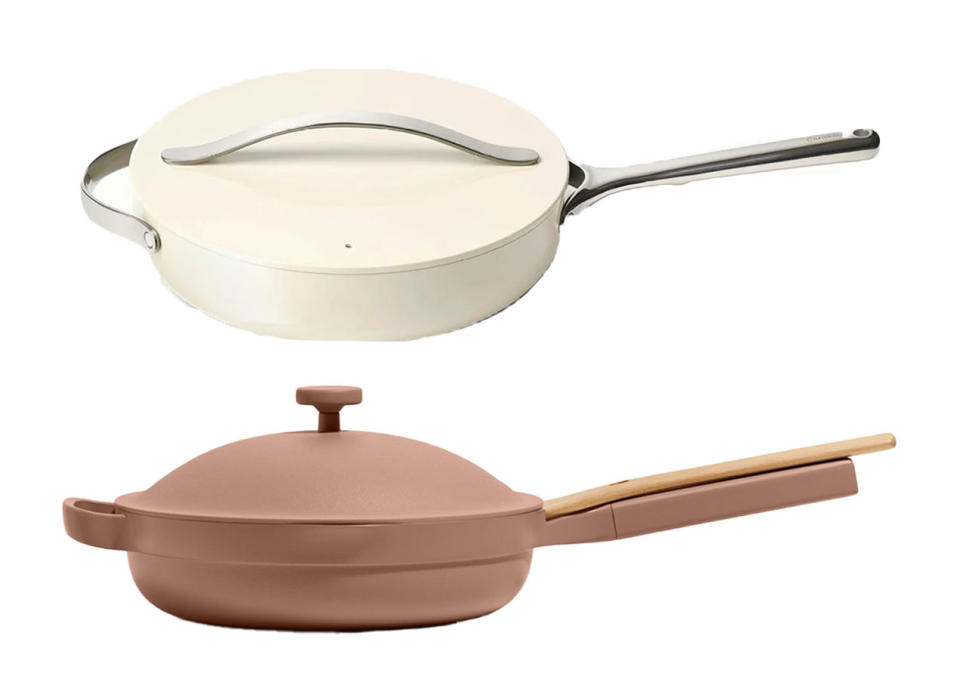
Caraway/Our Place
Both brands are known for their cookware’s eye-catching design, which marry form and function (sharp aesthetics paired with nontoxic, nonstick surfaces). These skillets are both ceramic-coated, stovetop agnostic and oven-safe, unlike many nonstick pans on the market. Because of their nonstick coatings, they’re both supposed to be used only over low or medium heat and with minimal oil or butter.
Another similarity between the two: You should avoid using metal utensils and abrasive sponges on both and keep them out of the dishwasher to preserve their nonstick capabilities for as long as possible. Both pans’ handles and lids also get hot with prolonged use (we found that on the stove, the Always Pan’s handle heats up faster).
My Our Place Always Pan 2.0 Review
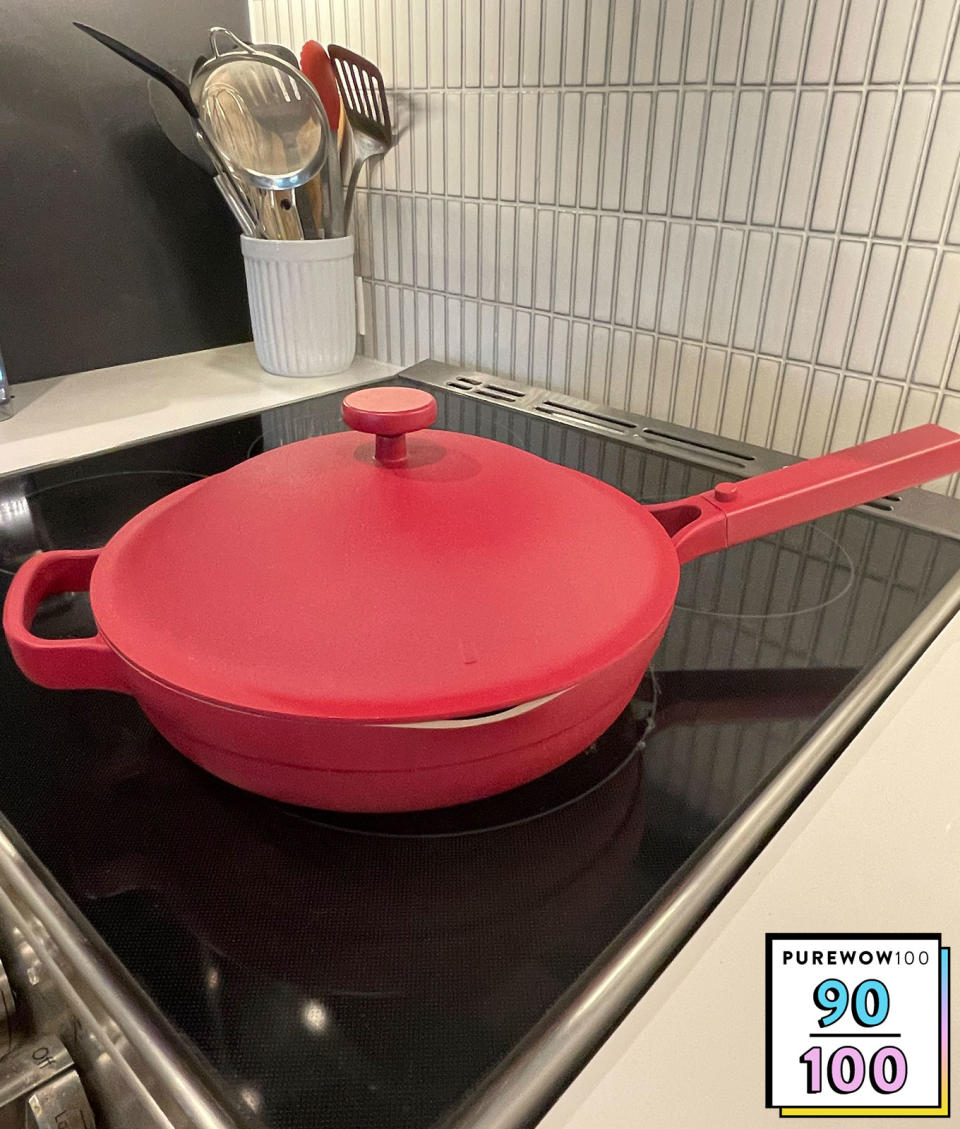
TOTAL: 90/100
The Always Pan’s claim to fame is that it’s a ten-in-one skillet that’s meant to replace a number of cookware pieces (so in theory, it can save you storage space). This pan can braise, sear, steam, strain, sauté, fry, boil and bake, and it can work its magic on the stove and in the oven. Bonus? The domed lid features a steam-release vent and self-bastes your food to keep it moist, two features we love.
As someone who ran the original iteration of the Always Pan into the ground, I can attest that the 2.0 is indeed a major improvement. The O.G. wasn’t oven safe, it stained easily, the nonstick coating didn’t last as long as I’d hoped, and the handle chipped after a few months. The new version of the Always Pan is much more durable, thanks to its nontoxic Thermakind coating that reportedly lasts “50 percent longer” than the original. I found that the pan’s surface is pretty slippery, but that I still needed to grease it with oil, especially for more fragile foods, like over-easy eggs and salmon. I also found it harder to scrub off stuck-on food than with Caraway’s equivalent.
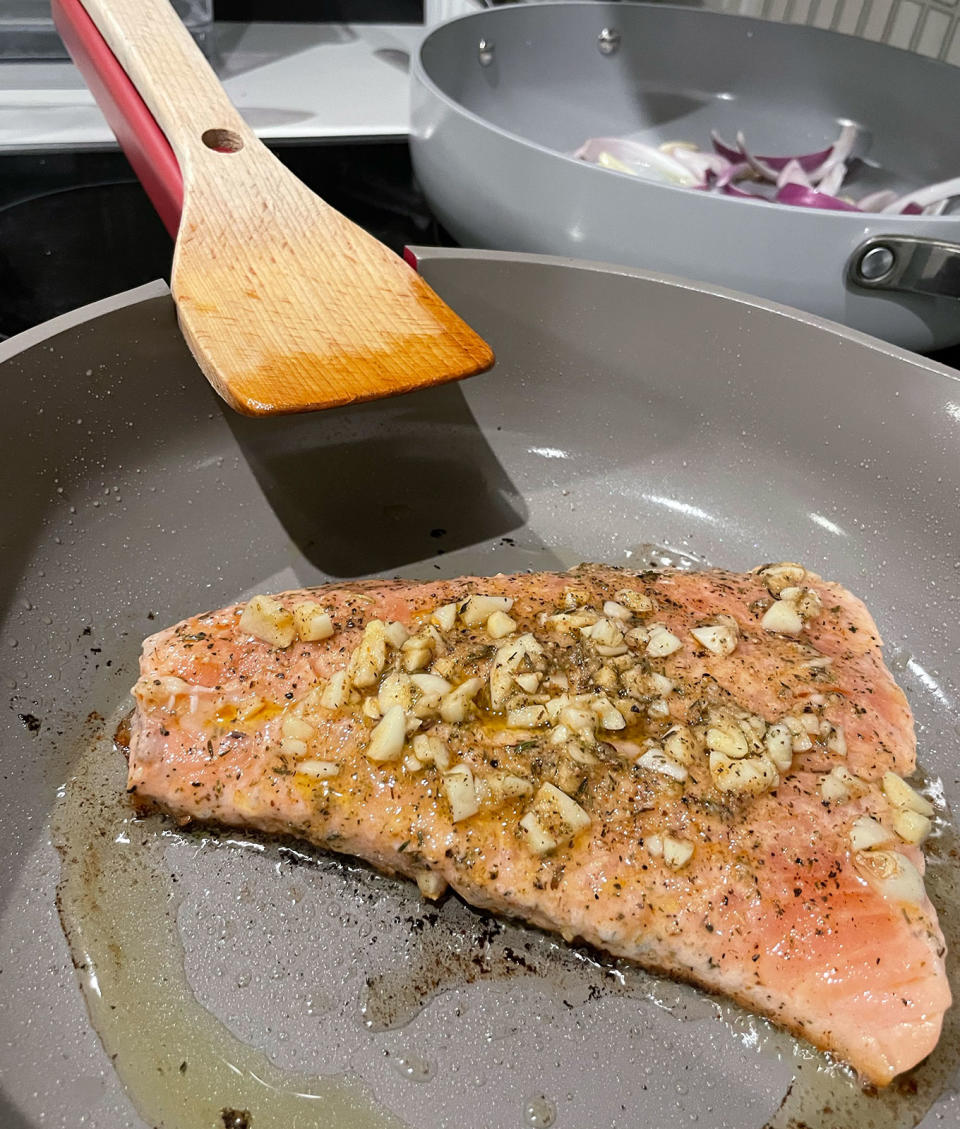
Taryn Pire
The pan’s size is a pro and con alike in our book: It’s lightweight and easy to maneuver, but it’s also not as roomy as the Caraway Sauté Pan, which may be an issue if you’re usually cooking for a crowd or meal prepping for the week. (We didn’t put Our Place’s claim that the pan is “deep enough to roast a chicken” to the test, but we’re skeptical.) While it was designed with multifunctionality in mind (we love you, nested spoon rest), senior food editor Katherine Gillen argues that the pan isn’t exactly compact. “It’s not a very sleek design; it’s sort of chunky and hard to store, and not very ergonomic.” On the plus side, it does come in a rainbow of chic colors.
Fast Facts
Cooking Surface: ceramic nonstick coating
Oven-Safe Temperature: 450°F
Induction Compatible: yes
Color Options: sage, spice, char, steam, blue salt, lavender, turmeric, rosa, azul, cielo, tierra
Price: $150
My Caraway Sauté Pan Review
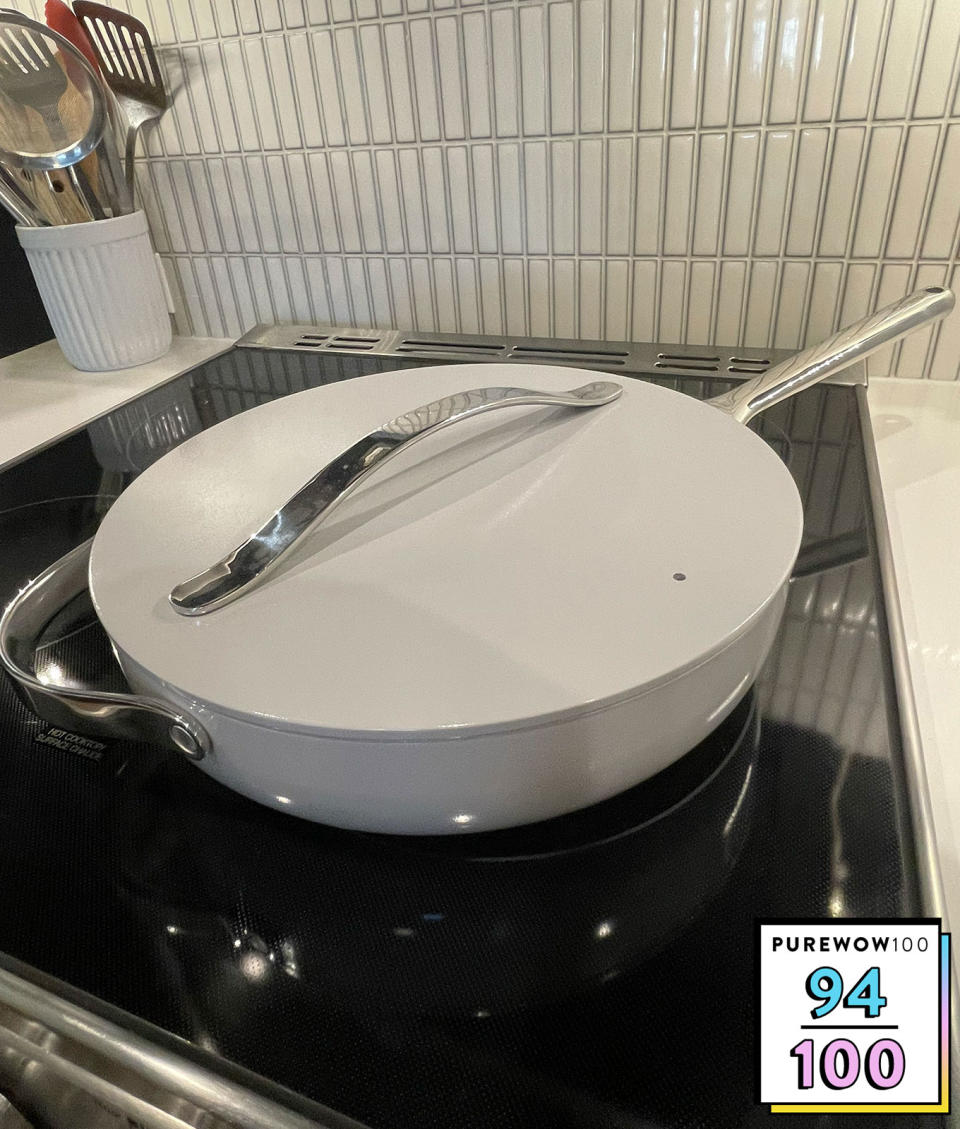
TOTAL: 94/100
Caraway’s biggest selling point is its nontoxic ceramic coating that’s as functional as it is attractive. Its aluminum core allows the pan to heat quickly and evenly, despite being large. Its size is probably the biggest pro it has over the Always Pan, as it boasts nearly double the capacity, so you can whip up family-style meals without dirtying multiple pans. We love the Sauté Pan for cooking vegetables for the week ahead, or a big batch of pasta or beans. Then again, the skillet is heavier and tougher to maneuver compared to the Always Pan.
We found that the Sauté Pan was easier to clean than the Always Pan 2.0—stuck-on messes come off with a gentle scrub—and more nonstick. “We never fully believe the brands that claim, ‘you can cook with no oil!’ (you can’t do that),” writes Gillen, “but Caraway is slippery enough to fry eggs, fillets of fish and delicate crab cakes with a touch less oil than we’d use with stainless steel or cast iron.”
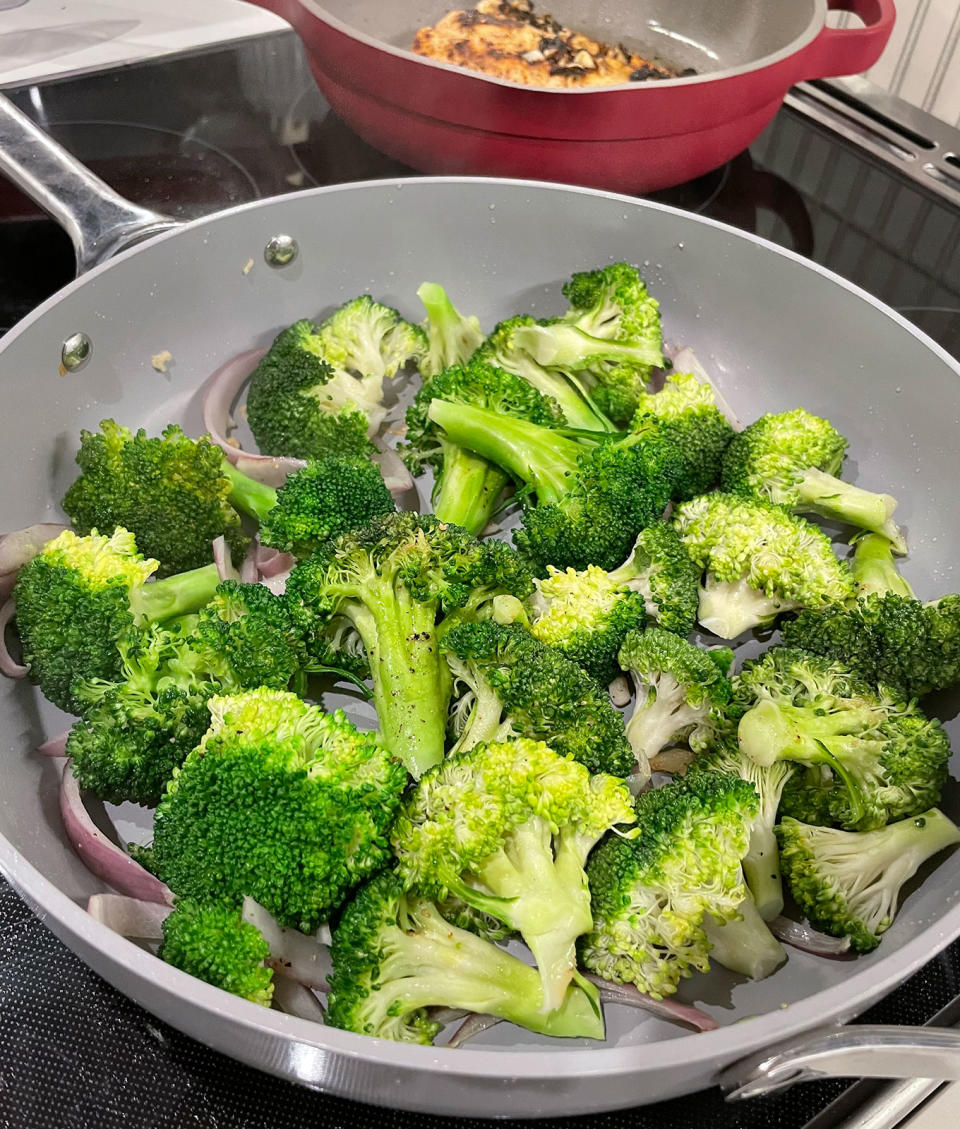
Taryn Pire
Eighteen months into testing, Gillen claims that her pan only suffered a few minor scratches from metal utensils and some discoloration at the bottom of the pan. She also likes that the lid is flat for easy storage, as opposed to the Always Pan’s more bulbous lid (which also may keep it from sliding easily into your oven, depending on how the racks are spaced out).
We also love that it’s oven-safe up to 550°F. For tasks like reverse searing a steak, cast iron or stainless steel are better options overall, but Caraway wins this face-off because it can handle higher heat and offer better results.
Fast Facts
Cooking Surface: ceramic nonstick coating
Oven-Safe Temperature: 550°F
Induction Compatible: yes
Color Options: cream, navy, gray, sage, perracotta, marigold, black, white
Price: $145
Caraway Sauté Pan vs. Our Place Always Pan: What Are the Main Differences?
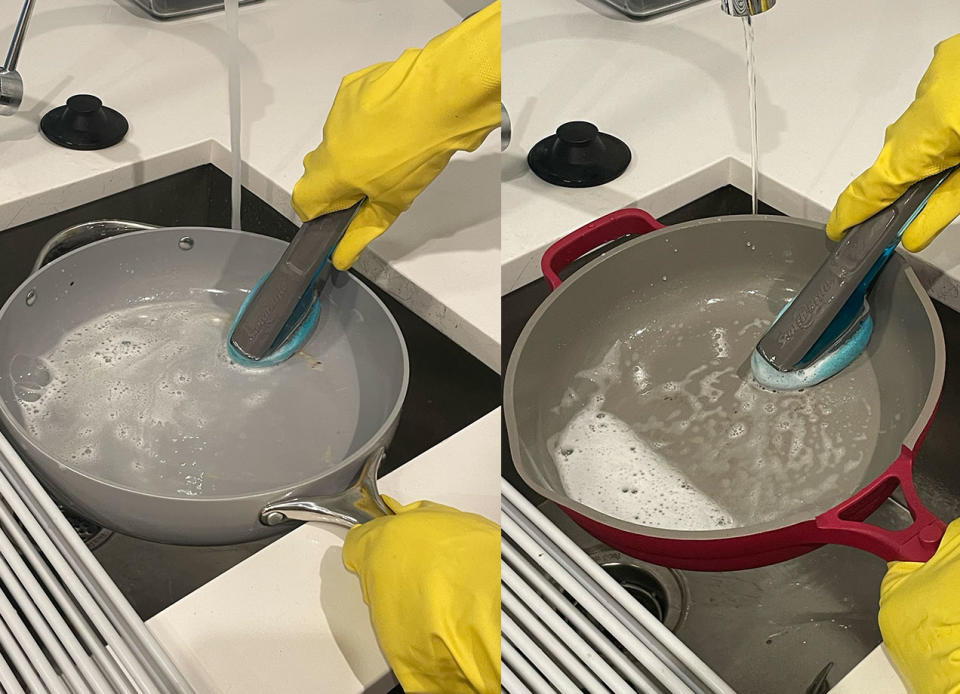
Taryn Pire
Despite their many similarities, these two pans have a few key differences:
Caraway’s Sauté Pan has a higher oven-safe temperature
The Always Pan 2.0 comes with accessories and a built-in spoon rest
The Sauté Pan is heavier and larger than the Always Pan 2.0 and takes longer to heat up
The Sauté Pan has a flat lid, while the Always Pan 2.0 has a domed lid
In our testing, we found that the Sauté Pan was slightly easier to clean and generally more nonstick than the Always Pan 2.0
The Bottom Line
Listen, both pans are fine buys. If you really love the look of the Always Pan 2.0, go ahead and add it to your cart—you won’t be disappointed. But if you’re typically cooking for a crowd or big-batch prepping, the larger Sauté Pan may be the smarter choice.
That being said, you should still have a cast iron or stainless steel skillet that can handle high heat and plenty of time in the oven for tasks that require browning or searing. But if you’re specifically looking for a nontoxic, nonstick pan that will look cute on your stovetop, you can’t go wrong with either of these.

